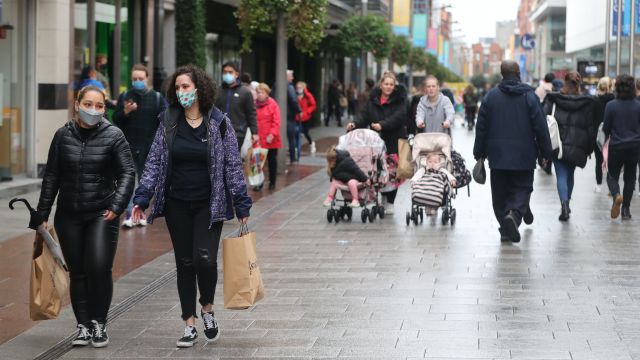As part of its second lockdown strategy, the Government said it would introduce the concept to ease isolation issues.
On Monday, ministers agreed to impose the highest level of restrictions under the five-tier plan from midnight on Wednesday for six weeks in a bid to curb the spread of Covid-19.
In doing so, Ireland will adopt one of the strictest lockdowns in Europe.
The single household bubbles are designed to ease loneliness.
However, in guidance published on Tuesday, the Government limited the bubbles to those who live alone and have “mental health challenges”.
Others permitted to form a bubble include single parents, those who are sharing parenting or custody arrangements, those who live with a partner who has dementia, and those who live alone but have a carer.
Labour Senator Rebecca Moynihan, who mooted the idea recently, queried why an individual has to have a mental health challenge to qualify for the measure.
“Research into social bubbling is that it is a way of decreasing our isolation and loneliness, but not contributing to the spread of the virus,” she said.
“A lot of people aren’t going to necessarily want to define themselves as having mental health challenges and I think the Government needs to clarify that people who are in single households can bubble with other people in another single household.
“At this stage of the pandemic you have to give positive messages about what people can do to stop the spread of the virus as opposed to telling people what they can’t do.
“If you are, for example, a 76-year-old woman who is living alone and want to have tea with your best friend indoors, because it’s the middle of winter, why should you have to define yourself as having mental health challenges?
Our senator @RebeccaMoy has said today
“ A lot of people in March and April were socially isolated. We have issues around Government advice around social bubbling. People don’t want to define themselves around the state of their mental health when it comes to bubbling.” pic.twitter.com/iW9Ghw4XaT— The Labour Party (@labour) October 20, 2020
“Are you even going to consider yourself in that situation as having mental health challenges?
“But, as a result of feeling that you are not allowed to do it, you might end up having those challenges.”
Taoiseach Micheál Martin said that country-wide restrictions will come into force from midnight on Wednesday and last until December 1st.
It comes amid a record number of cases recorded over recent weeks.
Under the restrictions, schools and creches will remain open.
No social or family gatherings will be allowed in homes or gardens, but visits on compassionate grounds and for caring purposes can continue.
Attendance at weddings will be maintained at 25 guests.
Restaurants, cafes and bars will be permitted to provide takeaway services only. Only essential retail may remain open.
Labour leader Alan Kelly said the introduction of rapid testing for Covid-19 would be a significant “game-changer”.
He said rapid testing could be carried out in schools, sports organisations and other social and work settings.
He has also called for the Government to publish targets that would need to be achieved to return the country to Level 3 and 2.
Mr Kelly added: “We need to have a measurement as to what needs to be achieved in order to get to Level 2 or 3.
“The Government needs to come and say what needs to happen, what R rate do we need to get to, where statistically do we need to arrive at to ensure we can get to Level 3 by December 1st.
“That will give people more hope, then we can rally together.”







